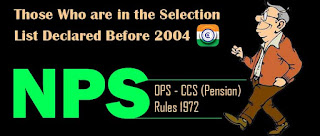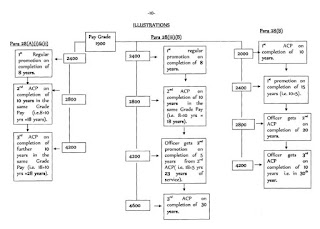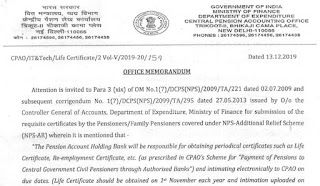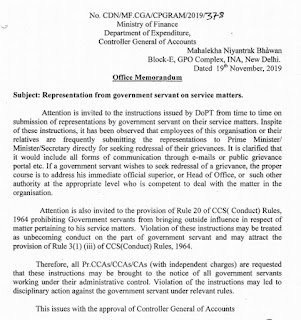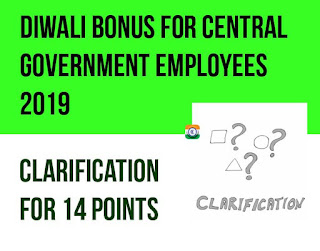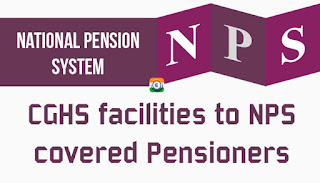MACP SCHEME FOR THE CENTRAL GOVERNMENT CIVILIAN EMPLOYEES ORIGINAL ORDER DATED MAY 2009
IMMEDIATE
No.35034/3/2008-Estt. (D)
Government of India
Ministry of Personnel, Public Grievances and Pensions
(Department of Personnel and Training)
North Block, New Delhi, the 19th May, 2009
OFFICE MEMORANDUM
SUBJECT:
MODIFIED ASSURED CAREER PROGRESSION SCHEME (MACPS) FOR THE CENTRAL GOVERNMENT CIVILIAN EMPLOYEES
The Sixth Central Pay Commission (
6CPC)
in Para 6.1.15 of its report, has recommended Modified Assured Career
Progression Scheme (MACPS). As per the recommendations, financial
upgradation will be available in the next higher grade pay whenever an
employee has completed 12 years continuous service in the same grade.
However, not more than two financial upgradations shall be given in the
entire career, as was provided in the previous Scheme. The Scheme will
also be available to all posts belonging to Group "A" whether isolated
or not. However, organised Group "A" services will not be covered under
the Scheme
2. The Government has considered the
recommendations of the Sixth Central Pay Commission for introduction of a
MACPS and has accepted the same with further modification to grant
three financial upgradations under the MACPS at intervals of 10, 20 and
30 years of continuous regular service.
3. The Scheme would be known as
"MODIFIED ASSURED CAREER PROGRESSION. SCHEME (MACPS) FOR THE CENTRAL GOVERNMENT CIVILIAN EMPLOYEES.
This Scheme is in supersession of previous ACP Scheme and
clarifications issued there under and shall be applicable to all
regularly appointed Group "A", "B", and "C"
Central Government Civilian Employees except officers of the Organised Group "A" Service.
The status of Group "0" employees would cease on their completion of
prescribed training, as recommended by the Sixth Central Pay Commission
and would be treated as Group "C" employees. Casual employees, including
those granted 'temporary status' and employees appointed in the
Government only on adhoc or contract basis shall not qualify for
benefits under the aforesaid Scheme. The details of the MACP Scheme and
conditions for grant of the financial upgradation under the Scheme are
given in Annexure-I.
4. An Screening Committee shall be
constituted in each Department to consider the case for grant of
financial upgradations under the MACP Scheme. The Screening Committee
shall consist of a
Chairperson and two members. The members of
the Committee shall comprise officers holding posts which are at least
one level above the grade in which the MACP is to be considered and not
below the rank of Under Secretary equivalent in the Government. The
Chairperson should generally be a grade above the members of the
Committee.
5. The recommendations of the Screening
Committee shall be placed before the Secretary in cases where the
Committee is constituted in the Ministry / Department or before the
Head of the organisation / competent authority in other cases for
approval.
6. In order to prevent undue strain on the administrative machinery, the Screening Committee shall follow a
time-schedule and meet twice in a financial year - preferably in the first week of
January and first week of
July of a year for
advance
processing of the cases maturing in that half. Accordingly, cases
maturing during the first-half (April - September) of a particular
financial year shall be taken up for consideration by the screening
Committee meeting in the first week of January. Similarly, the Screening
Committee meeting in the first week of July of any financial year shall
process the cases that would be maturing during the second-half
(October - March) of the same financial year.
7.
However, to make the MACP Scheme operational, the Cadre Controlling
Authorities shall constitute the first Screening Committee within a
month from the date of issue of these instructions to consider the cases
maturing upto 30th June, 2009 for grant of benefits under the MACPS.
8.
In so far as persons serving in The Indian Audit and Accounts
Departments are concerned, these orders issue after consultation with
the Comptroller and Auditor General of India.
9. Any
interpretation / clarification of doubt as to the scope and meaning of
the provisions of the MACP Scheme shall be given by the Department of
Personnel and Training (Establishment-D). The scheme would be
operational
w.e.f. 01.09.2008. In other words, financial
upgradations as per the provisions of the earlier ACP Scheme (of August,
1999) would be granted till 31.08.2008.
10. No
stepping up of pay in the pay band or grade pay would be admissible with
regard to junior getting more pay than the senior on account of pay
fixation under MACP Scheme.
11. It is clarified that no
past cases would be re-opened. Further, while implementing the MACP
Scheme, the differences in pay scales on account of grant of financial
upgradation under the old ACP Scheme (of August 1999) and under the MACP
Scheme within the same cadre shall not be construed as an anomaly.
12. Hindi version will follow.
(S.Jainendra Kumar)
Deputy Secretary to the Govt. Of India
ANNEXURE-I
MODIFIED ASSURED CAREER PROGRESSION SCHEME (MACPS)
1. There shall
be three financial upgradation s under the MACPS, counted from the
direct entry grade on completion of 10, 20 and 30 years service
respectively. Financial upgradation under the Scheme will be admissible
whenever a person has spent 10 years continuously in the same grade-pay.
2.
The MACPS envisages merely placement in the immediate next higher grade
pay in the hierarchy of the recommended revised pay bands and grade pay
as given in Section 1 , Part-A of the first schedule of the CCS
(Revised Pay) Rules, 2008. Thus, the grade pay at the time of financial
upgradation under the MACPS can, in certain cases where regular
promotion is not between two successive grades, be different than what
is available at the time of regular promotion. In such cases, the higher
grade pay attached to the next promotion post in the hierarchy of the
concerned cadre/ organisation will be given only at the time of regular
promotion.
3. The financial upgradation s under the MACPS would be admissible up-to the highest grade pay of Rs. 12000/- in the PB-4.
4.
Benefit of pay fixation available at the time of regular promotion
shall also be allowed at the time of financial upgradation under the
Scheme. Therefore, the pay shall be raised by 3% of the total pay in the
pay band and the grade pay drawn before such upgradation. There shall,
however, be no further fixation of pay at the time of regular promotion
if it is in the same grade pay as granted under MACPS. However, at the
time of actual promotion if it happens to be in a post carrying higher
grade pay than what is available under MACPS, no pay fixation would be
available and only difference of grade pay would be made available.
To
illustrate, in case a Government Servant joins as a direct recruit in
the grade pay of Rs. 1900 in PB-1 and he gets no promotion till
completion of 10 years of service, he will be granted financial
upgradation under MACPS in the next higher grade pay of Rs. 2000 and his
pay will be fixed by granting him one increment plus the difference of
grade pay (i.e. Rs. 100). After availing financial upgradation under
MACPS, if the Government servant gets his regular promotion in the
hierarchy of his cadre, which is to the grade of Rs. 2400, on regular
promotion, he will only be granted the difference of grade pay between
Rs. 2000 and Rs. 2400. No additional increment win be granted at this
stage.
5. Promotions earned / upgradations granted
under the ACP Scheme in the past to those grades which now carry the
same grade pay due to merger of pay scales / upgradations of posts
recommended by the Sixth Pay Commission shall be ignored for the purpose
of granting upgradations under Modified ACPS.
Illustration-1
The pre-revised hierarchy (in ascending order) in a particular organization was as under:-
- A Government servant who was recruited in the hierarchy in the
pre-revised pay scale Rs. 5000-8000 and who did not get a promotion even
after 25 years of service prior to 1.1.2006,in his case as on
1.1.2006he would have got two financial upgradations under ACP to the
next grades in the hierarchy of his organization, i.e., to the
pre-revised scales of Rs. 5500-9000 and Rs. 6500-10500.
- Another Government servant recruited in the same hierarchy in the
pre-revised scale of Rs. 5000-8000 has also completed about 25 years of
service, but he got two promotions to the next higher grades of Rs.
5500-9000 & Rs. 6500-10500 during this period.
In the case of both (a) and (b) above, the promotions /
financial upgradations granted under ACP to the pre-revised scales of
Rs. 5500-9000 and Rs. 6500-10500 prior to 1.1.2006will be ignored on
account of merger of the pre-revised scales of Rs. 5000- 8000, Rs.
5500-9000 and Rs. 6500-10500 recommended by the Sixth cpe. As per CCS
(RP) Rules, both of them will be granted grade pay of Rs. 4200 in the
pay band PB-2. After the implementation of MACPS, two financial
upgradations will be granted both in the case of (a) and (b) above to
the next higher grade pays of Rs. 4600 and Rs. 4800 in the pay band
PB-2.
6. In the case of all the employees granted
financial upgradations under ACPS till 01.01.2006, their revised pay
will be fixed with reference to the pay scale granted to them under the
ACPS.
6.1 In the case of ACP upgradations granted
between 01.01.2006 and 31.08.2008, the Government servant has the option
under the CCS (RP) Rules, 2008 to have his pay fixed in the revised pay
structure either (a) w.eJ. 01.01.2006 with reference to his pre-revised
scale as on 01.01.2006; or (b) w.e.f. the date of his financial
upgradation under ACP with reference to the pre-revised scale granted
under ACP. ln case of option (b), he shall be entitled to draw his
arrears of pay only from the date of his option i.e. the date of
financial upgradation under ACP.
6.2 In cases where
financial upgradation had been granted to Government servants in the
next higher scale in the hierarchy of their cadre as per the provisions
of the ACP Scheme of August, 1999, but whereas as a result of the
implementation of Sixth CPC's recommendations, the next higher post in
the hierarchy of the cadre has been upgraded by granting a higher grade
pay, the pay of such employees in the revised pay structure will be
fixed with reference to the higher grade pay granted to the post. To
illustrate, in the case of Jr. Engineer in CPWD, who was granted ]"t ACP
in his hierarchy to the grade of Asstt. Engineer in the pre-revised
scale of Rs.6500-10500 corresponding to the revised grade pay of Rs.4200
in the pay band PB-2, he win now be granted grade pay of Rs4600 in the
pay band PB-2 consequent upon upgradation of the post of Asstt. Enggs.In
CPWD by granting them the grade pay of Rs.4600 in PB-2 as a result of
Sixth CPC's recommendation. However, from the date of implementation of
the MACPS, all the financial upgradations under the Scheme should be
done strictly in accordance with the hierarchy of grade pays in pay
bands as notified vide CCS (Revised Pay) Rules, 2008.
7.
With regard to fixation of his pay on grant of promotion / financial
upgradation under MACP Scheme, a Government servant has an option under
FR22 (1) (a) (1) to get his pay fixed in the higher post/ grade pay
either from the date of his promotion/upgradation or from the date of
his next increment viz. 1st July of the year. The pay and the date of
increment would be flxed in accordance with clarification no.2 of
Department of Expenditure's O.M. No.1/1/2008-1C dated 13.09.2008.
8.
Promotions earned in the post carrying same grade pay in the
promotional hierarchy as per Recruitment Rules shall be counted for the
purpose of MACPS.
8.1 Consequent upon the
implementation of Sixth CPe's recommendations, grade pay of Rs. 5400 is
now in two pay bands viz., PB-2 and PB-3. The grade pay of Rs. 5400 in
PB-2 and Rs.5400 in PB-3 shall be treated as separate grade pays for the
purpose of grant of upgradations under MACP Scheme.
9.
'Regular service'
for the purposes of the MACPS shall commence from the date of joining
of a post in direct entry grade on a regular basis either on direct
recruitment basis or on absorption/re-employment basis. Service rendered
on adhoc/contract basis before regular appointment on pre-appointment
training shall not be taken into reckoning. However, past continuous
regular service in another Government Department in a post carrying same
grade pay prior to regular appointment in a new Department, without a
break, shall also be counted towards qualifying regular service for the
purposes of MACPS only (and not for the regular promotions). However,
benefits under the MACPS in such cases shall not be considered till the
satisfactory completion of the probation period in the new post.
10.
Past service
rendered by a Government employee in a State Government / statutory
body / Autonomous body / Public Sector organisation, before appointment
in the Government shall not be counted towards Regular Service.
Also check
7th CPC MACP FOR THE CENTRAL GOVERNMENT CIVILIAN EMPLOYEES – DOPT CONSOLIDATED GUIDELINES
11.
'Regular service'
shall include all periods spent on deputation/foreign service, study
leave and all other kind of leave, duly sanctioned by the competent
authority.
12. The MACPS shall also be applicable to
work charged employees, if their service conditions are comparable with
the staff' of regular establishment.
13. Existing
time-bound promotion scheme, including in-situ promotion scheme, Staff
Car Driver Scheme or any other kind of promotion scheme existing for a
particular category of employees in a Ministry / Department or its
offices, may continue to be operational for the concerned category of
employees if it is decided by the concerned administrative authorities
to retain such Schemes, after necessary consultations or they may
switch-over to the MACPS. However, these Schemes shall not run
concurrently with the MACPS.
14. The MACPS is directly
applicable only to Central Government Civilian employees. It will not
get automatically extended to employees of Central Autonomous /
Statutory Bodies under the administrative control of a Ministry /
Department. Keeping in view the financial implications involved, a
conscious decision in this regard shall have to be taken by the
respective Governing Body/Board of Directors and the administrative
Ministry concerned and where it is proposed to adopt the MACPS, prior
concurrence of Ministry of Finance shall be obtained.
15.
If a financial upgradations under the MACPS is deferred and not allowed
after 10 years in a grade pay, due to the reason of the employees being
unfit or due to departmental proceedings, etc., this would have
consequential effect on the subsequent financial upgradation which would
also get deferred to the extent of delay in grant of first financial
upgradation.
16. On grant of financial upgradation
under the Scheme, there shall be no change in the designation,
classification or higher status. However, financial and certain other
benefits which are linked to the pay drawn by an employee such as HBA,
allotment of Government accommodation shall be permitted.
17.
The financial upgradation would be on non-functional basis subject to
fitness, in the hierarchy of grade pay within the PB-1.Thereafter for
upgradation under the MACPS the benchmark of 'good' would be applicable
till the grade pay of Rs. 6600/- in PB-3. The benchmark will be 'Very
Good' for financial upgradation to the grade pay of Rs.7600 and above.
18.
In the matter of disciplinary/ penalty proceedings, grant of benefit
under the MACPS shall be subject to rules governing normal promotion.
Such cases shall, therefore, be regulated under the provisions of the
CCS (CCA) Rules, 1965 and instructions issued thereunder.
19.
The MACPS contemplates merely placement on personal basis in the
immediate higher Grade pay /grant of financial benefits only and shall
not amount to actuallfunctional promotion of the employees concerned.
Therefore, no reservation orders/roster shall apply to the MACPS, which
shall extend its benefits uniformly to all eligible SC/ST employees
also. However, the rules of reservation in promotion shall be ensured at
the time of regular promotion. For this reason, it shall not be
mandatory to associate members of SC/ST in the Screening Committee meant
to consider cases for grant of financial upgradation under the Scheme.
20.
Financial upgradation under the MACPS shall be purely personal to the
employee and shall have no relevance to his seniority position. As such,
there shall be no additional financial upgradation for the senior
employees on the ground that the junior employee in the grade has got
higher pay/grade pay under the MACPS.
21. Pay drawn in
the pay band and the grade pay allowed under the MACPS shall be taken as
the basis for determining the terminal benefits in respect of the
retiring employee.
22. If Group "A" Government
employee, who was not covered under the ACP Scheme has now become
entitled to say third financial upgradation directly, having completed
30 year's regular service, his pay shall be fixed successively in next
three immediate higher grade pays in the hierarchy of revised pay-bands
and grade pays allowing the benefit of 3% pay fixation at every stage.
Pay of persons becoming eligible for second financial upgradation may
also be fixed accordingly.
23. In case an employee is
declared surplus in his / her organisation and appointed in the same
pay-scale or lower scale of pay in the new organization, the regular
service rendered by him/her in the previous organisation shall be
counted towards the regular service in his/her new organisation for the
purpose of giving nnancial upgradation under the MACPS.
24.
In case of an employee after getting promotion/ACP seeks unilateral
transfer on a lower post or lower scale, he will be entitled only for
second and third nnancial upgradations on completion of 20/30 years of
regular service under the MACPS, as the case may be, from the date of
his initial appointment to the post in the new organization.
25.
If a regular promotion has been offered but was refused by the employee
before becoming entitled to a financial upgradation, no financial
upgradation shall be allowed as such an employee has not been stagnated
due to lack of opportunities. If, however, financial upgradation has
been allowed due to stagnation and the employees subsequently refuse the
promotion, it shall not be a ground to withdraw the financial
upgradation. He shall, however, not be eligible to be considered for
further financial upgradation till he agrees to be considered for
promotion again and the second the next financial upgradation shall also
be deferred to the extent of period of debarment due to the refusal.
26.
Cases of persons holding higher posts purely on adhoc basis shall also
be considered by the Screening Committee alongwith others. They may be
allowed the benefit of financial upgradation on reversion to the lower
post or if it is beneficial vis-a-vis the pay drawn on adhoc basis.
27.
Employees on deputation need not revert to the parent Department for
availing the benefit of financial upgradation under the MACPS. They may
exercise a fresh option to draw the pay in the pay band and the grade
pay of the post held by them or the pay plus grade pay admissible to
them under the MACPS, whichever is beneficial.
28.
Illustrations :
A
(i) If a Government servant (LDC) in PB-l in the Grade Pay of Rs.1000
gets his first regular promotion (UDC) in the PB-1 in the Grade Pay of
Rs.2400 on completion of 8 years of service and then continues in the
same Grade Pay for further 10 years without any promotion then he would
be eligible for 2nd financial upgradation under the MACPS in the PB-1 in
the Grade Pay of Rs.2800 after completion of 18 years (8+10 years).
(ii)
In case he does not get any promotion thereafter, then he would get 3rd
financial upgradation in the PB-II in Grade Pay of Rs.4200 on
completion of further 10 years of service i.e. after 28 years (8+10+10).
(iii) However, if he gets 2nd promotion after 5 years of further service in the pay PB-II in the Grade Pay of Rs.4200 (
Asstt. Grade/Grade "C")
i.e. on completion of 23 years (8+10+5years) then he would get 3rd
financial upgradation after completion of 30 years i.e. 10 years after
the 2nd ACP in the PB-II in the Grade Pay of Rs.4600.



